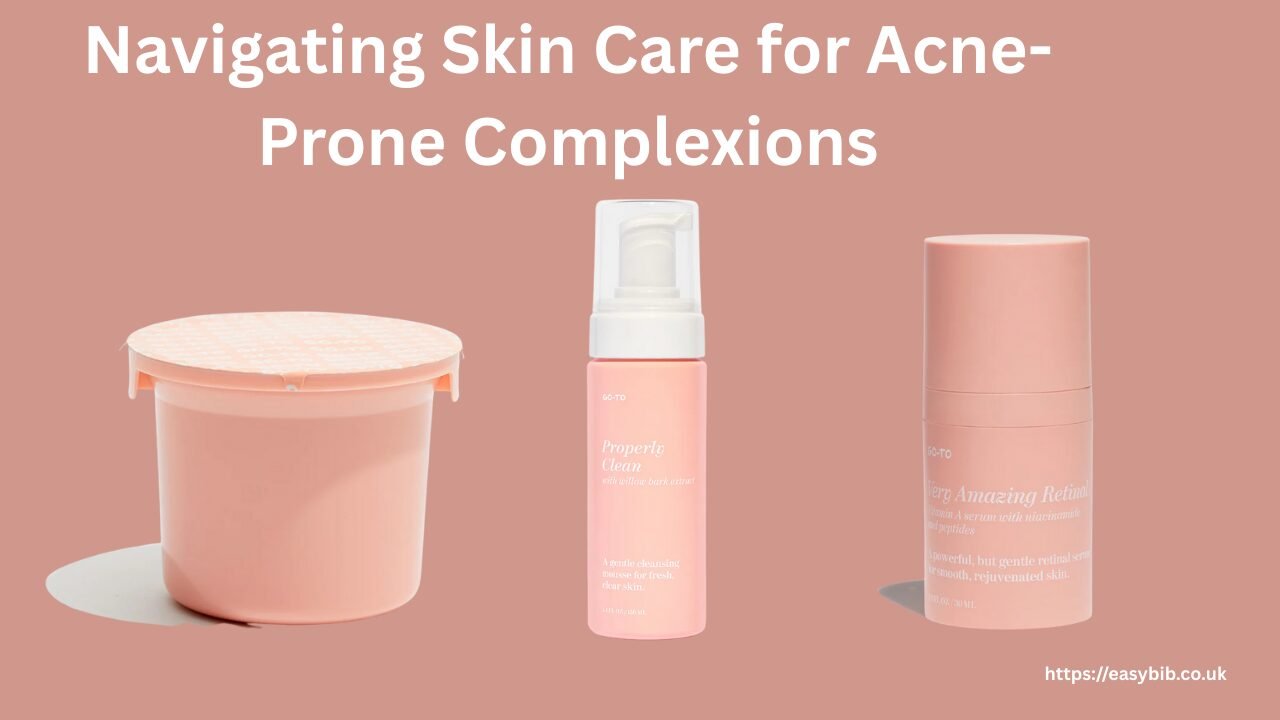Navigating Skin Care for Acne-Prone Complexions

Acne-prone complexions can be challenging to manage. This skin type is sensitive to various factors and requires careful attention to products and ingredients. This article outlines how to navigate the intricate world of skincare for those with acne-prone complexions.
Understanding Acne-Prone Skin
Acne prone skin is more prone to developing comedones, papules, and pustules than other skin types. It is characterised by an overproduction of oil, which, along with dead skin cells and bacteria, can lead to blocked pores and breakouts.
While acne is often associated with adolescence, it can persist into adulthood or even appear for the first time in one’s twenties or thirties, a condition known as adult-onset acne. Several contributing factors, including hormonal imbalances, diet, stress, and the use of unsuitable skincare products, can exacerbate this skin condition.
Daily Skincare Routine for Acne-Prone Skin
Establishing a daily skincare routine is essential for managing acne-prone skin. A carefully planned skincare routine helps regulate oil production, clears away impurities, keeps pores open, and reduces skin irritation.
Gentle Cleansing
The first step is gentle cleansing. Using harsh soaps can strip the skin of its natural oils, which may trigger increased sebum production and worsen acne. Instead, opt for mild, non-comedogenic cleansers designed for sensitive or acne-prone skin.
Exfoliation
Exfoliating regularly can be helpful, but it must be approached gently and with care. Over-exfoliating can irritate and damage the skin barrier, so it’s crucial to use products that contain gentle exfoliants tailored for acne-prone skin, avoiding those with large abrasive particles.
Toning
Applying a toner can help to balance the skin’s pH levels and reduce the appearance of pores. It can also provide additional cleansing by removing any traces of dirt or makeup left after washing the face.
Moisturising
Acne-prone skin still needs hydration. Many people make the mistake of skipping moisturiser, fearing it will make their skin oilier. However, using oil-free and non-comedogenic moisturisers can hydrate the skin without clogging pores. Moisturisers containing ingredients like hyaluronic acid or ceramides can be particularly beneficial.
Sun Protection
Sun protection is just as crucial for this skin type. Sunscreen helps prevent hyperpigmentation and scarring, which can occur as a result of acne. Opt for a broad-spectrum sunscreen formulated for oily or sensitive skin, ensuring it protects without blocking pores.
Targeted Treatments for Acne-Prone Skin
Spot treatments and serums containing active ingredients can help to tackle specific acne-related issues. Ingredients like salicylic acid, benzoyl peroxide, and retinoids are known to be effective in treating acne, but should be introduced into the routine carefully.
It’s essential to patch-test new treatments and introduce them gradually to monitor how the skin reacts. Some ingredients, especially retinoids, may cause initial irritation or purging, so starting with lower concentrations and less frequent application is advisable.
Lifestyle Considerations for Acne-Prone Complexions
Lifestyle habits and dietary choices play a crucial role in influencing skin health. Consumption of high-glycaemic-index foods and dairy has been linked to acne in some individuals. Maintaining a balanced diet rich in fruits, vegetables, whole grains, and lean proteins can support overall skin health.
Managing stress is another crucial element. Stress can affect hormone levels and exacerbate acne; therefore, incorporating stress-relief practices like exercise, meditation, and adequate sleep can be beneficial.
It is also essential to avoid picking or squeezing pimples as this can lead to scarring and further inflammation.
Professional Treatments for Acne-Prone Skin
Professional treatments can be a valuable addition to a home care regimen. These can include chemical peels, laser therapy, and microdermabrasion, which a licensed dermatologist or skincare professional should perform.
Product Selection for Acne-Prone Skin
When selecting products, it’s crucial to read labels and ingredient lists. Look for products that are labelled as “oil-free,” “non-comedogenic,” or “suitable for acne-prone skin.” Avoid ingredients like coconut oil or cocoa butter, which can be too heavy and potentially clog pores.
The vast range of skincare products can make selecting the most suitable ones feel daunting. Hence, it might be beneficial to opt for a targeted collection designed for acne-prone skin. These collections are often formulated with the needs of acne-prone complexions in mind, ensuring that the products work in harmony to combat acne while nurturing the skin.
Finally, remember that patience and consistency are essential. Acne treatments often require time to show results, and consistency is crucial for long-term management of acne-prone skin. Establishing a routine and sticking to it, even when breakouts occur, is fundamental for clear, healthy-looking skin.
READ MORE
Conclusion
Navigating skincare for acne-prone complexions requires a careful balance of product usage, lifestyle choices, and, in some cases, professional intervention. With a conscientious approach and an understanding of your individual skin characteristics, managing acne-prone skin can become a more straightforward and less stressful journey.
